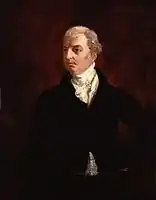Liverpool ministry
This is a list of members of the government of the United Kingdom in office under the leadership of Lord Liverpool from 1812 to 1827. He was appointed Prime Minister of the United Kingdom by the Prince Regent after the assassination of Spencer Perceval.
Liverpool ministry | |
|---|---|
.svg.png.webp) | |
| 1812–1827 | |
 Liverpool (1823) | |
| Date formed | 8 June 1812 |
| Date dissolved | 9 April 1827 |
| People and organisations | |
| Monarch |
|
| Represented by | Prince Regent (1812–1820) |
| Prime Minister | Lord Liverpool |
| Member party | Tory Party |
| Status in legislature | Majority |
| Opposition party | Whig Party |
| Opposition leaders |
|
| History | |
| Election(s) | |
| Legislature term(s) | |
| Predecessor | Perceval ministry |
| Successor | Canning ministry |
Cabinet
1812–1827
- Lord Liverpool – First Lord of the Treasury and Leader of the House of Lords
- Lord Eldon – Lord Chancellor
- Lord Harrowby – Lord President of the Council
- Lord Westmorland – Lord Privy Seal
- Lord Sidmouth – Secretary of State for the Home Department
- Lord Castlereagh (Lord Londonderry after 1821) – Secretary of State for Foreign Affairs and Leader of the House of Commons
- Lord Bathurst – Secretary of State for War and the Colonies
- Lord Melville – First Lord of the Admiralty
- Nicholas Vansittart – Chancellor of the Exchequer
- Lord Mulgrave – Master-General of the Ordnance
- Lord Buckinghamshire – President of the Board of Control
- Charles Bathurst – Chancellor of the Duchy of Lancaster
- Lord Camden – minister without portfolio
Changes
- Late 1812 – Lord Camden leaves the Cabinet
- September 1814 – William Wellesley-Pole (Lord Maryborough from 1821), the Master of the Mint, enters the Cabinet
- February 1816 – George Canning succeeds Lord Buckinghamshire at the Board of Control
- January 1818 – Frederick John Robinson, the President of the Board of Trade, enters the Cabinet
- January 1819 – The Duke of Wellington succeeds Lord Mulgrave as Master-General of the Ordnance. Lord Mulgrave becomes minister without portfolio
- 1820 – Lord Mulgrave leaves the cabinet
- January 1821 – Charles Bathurst succeeds Canning as President of the Board of Control, remaining also at the Duchy of Lancaster
- January 1822 – Robert Peel succeeds Lord Sidmouth as Home Secretary
- February 1822 – Charles Williams-Wynn succeeds Charles Bathurst at the Board of Control. Bathurst remains at the Duchy of Lancaster and in the Cabinet
- September 1822 – Following the suicide of Lord Londonderry, George Canning becomes Foreign Secretary and Leader of the House of Commons
- January 1823 – Vansittart, elevated to the peerage as Lord Bexley, succeeds Charles Bathurst as Chancellor of the Duchy of Lancaster. F.J. Robinson succeeds Vansittart as Chancellor of the Exchequer. He is succeeded at the Board of Trade by William Huskisson
- 1823 – Lord Maryborough, the Master of the Mint, leaves the Cabinet. His successor in the office is not a Cabinet member
Full list of ministers
Members of the Cabinet are in bold face.
- Notes
- Created Earl of Eldon in July 1821.
- Succeeded as Marquess of Londonderry, 6 April 1821.
- Styled as Earl of Mount Charles after 1824.
- Became Sir John Osborn, Bt, in 1818.
- Created Baron Bexley 1 March 1823.
- Succeeded as Baron Downes, 3 March 1826.
- Created Baron Maryborough 17 July 1821.
- Created Marquess Camden in September 1812.
References
- Chris Cook and John Stevenson, British Historical Facts 1760–1830
- Joseph Haydn and Horace Ockerby, The Book of Dignities
This article is issued from Wikipedia. The text is licensed under Creative Commons - Attribution - Sharealike. Additional terms may apply for the media files.
_(2022).svg.png.webp)